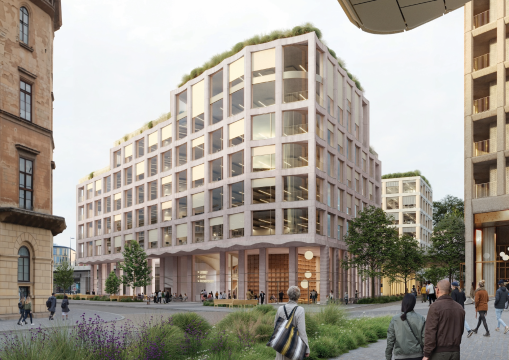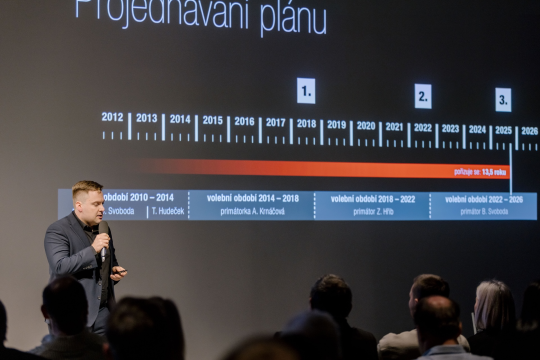Prague moves to make flats cheaper. An amendment to the city’s building regulations addresses parking requirements in new buildings and renovations.
The Prague City Council has approved a draft amendment to the Prague Building Regulations that regulates parking in new residential and office buildings and in renovations requiring a building permit. The amendment would ensure that these types of projects would not have to comply with previously established parking space minimums in the wider city center. Instead, the number of parking spaces provided would be up to the project developer. The aim of the amendment is to reduce the price of new and renovated apartments in the city. Approval of the draft amendment kicks off a 45-day comment period, however, it will be up to the new City Council to decide whether the amendment will take effect.

A tool for cheaper apartments and nicer streets
The amendment aims to open up possibilities so that in some locations that have, for example, good connections to public transport, or where building parking spaces would be economically challenging, it would not be necessary to keep to current minimum parking space requirements. In the city center, the cost of building one underground parking space can reach CZK 2 million, and there is no maximum number of spaces stipulated.
Visitor parking spaces, which have a different coefficient in the calculation, are also a problem. Investors usually set them up on the ground floor of buildings, which significantly affects the appearance of the streets. In addition, visitor parking spaces are factored into the price of all units sold and often significantly increase the price of real estate, especially if they are underground. The amendment therefore proposes to reduce the minimums for this type of parking as well.
"The calculation as such has proven itself, and the ambition of this amendment is not to change it. The aim, however, is to define the zones on the map more precisely, based on more accurate algorithms of public transport accessibility, as well as to complete a major upgrade of virtually the entire tram network from the center onwards. Reducing the minimum number of parking spaces will have a major impact on real estate prices, which may fall significantly as a result," says Petr Hlaváček, Deputy Mayor. "We want the new council to have a tool to make apartments cheaper, but it will be up to the council to decide whether to adopt it."
"By minimizing parking minimums, we are removing unnecessary market regulation. The developer will be free to choose whether to build a building with underground garages or an apartment building without parking spaces if it is located, for example, in development areas along the newly built tram lines or the D metro. In Zone 4, for example, the tram lines have now been completely reconstructed, providing a reliable and fast means of transport with short commuting times to the center or to metro and rail stations. All metro stations outside the so-called inner city are now in Zone 5, as the original fears of pressure to build parking blocks outside the metro termini have not been confirmed," comments Adam Scheinherr, Deputy Mayor for Transport.
Sustainable City
Fewer parking spaces mean more room for the development of a sustainable city, where unnecessary car journeys could be reduced, lower property prices in the city center could lead to a more diverse population, and the development of a 'short distance city' where everything needed is within easy reach and in line with the Strategic Plan, the Sustainable Mobility Plan and the Prague Climate Plan could be achieved. Many cities outside of the Czech Republic have abolished parking minimums altogether and leave the establishment of parking spaces to market requirements.
"In addition to the positive impact on the appearance and functioning of the city, I hope that the reduction of parking minimums will make housing construction cheaper and enable the implementation of smaller housing projects that are not economically viable today due to parking requirements. This will also make the construction of urban rental housing, which Prague is preparing, cheaper," adds Prague's Councillor for Housing and Transparency, Adam Zábranský.
"Through this amendment, we have reduced the parking requirement by 25 percent on average. This gives investors and building authorities more freedom to decide how many spaces they will build, or for whom their project is intended. In the historic city center, one underground parking space can cost up to CZK 2 million, and investors may not have enough money to renovate buildings because of this requirement. Thanks to this step, they can reduce their costs, which will have a positive impact on the price of real estate and enable ordinary residents to live in the city center," adds Ondřej Boháč, Director of the Prague Institute of Planning and Development.
Mohlo by Vás také zajímat

Pražany baví participační hra. V roce 2025 se do projektu Tvoje město, Tvůj prostor zapojily skoro tři stovky návštěvníků

Novou Florenc navrhne 15 evropských ateliérů. Praha zná vítězné návrhy mezinárodních architektonických soutěží

